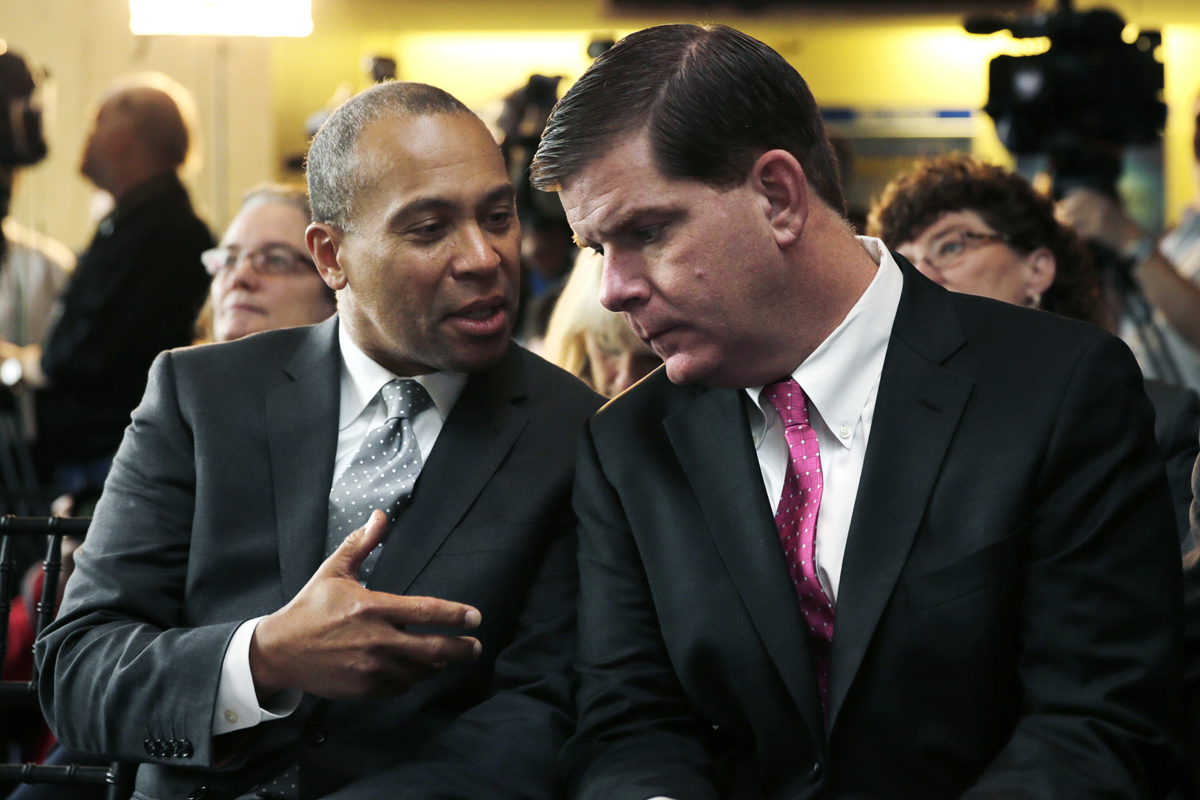Marty Walsh on Dzhokhar Tsarnaev Death Penalty Decision: ‘I Support the Process’

Photo via Associated Press
Just hours after officials announced they would authorize federal prosecutors to seek the death penalty against Boston Marathon bombing suspect Dzhokhar Tsarnaev, Mayor Marty Walsh said he backed the decision in terms of the judicial process, but still personally opposed the harsh form of punishment.
“[Attorney General Eric Holder] has applied the law in this case, and I support the process that brought him to this decision,” Walsh said to reporters during a press conference at City Hall late Thursday afternoon.
Earlier in the day, Holder authorized prosecutors to pursue capital punishment against Tsarnaev for his alleged role in setting off two bombs at the Boston Marathon finish line, killing three people and injuring more than 250 others. Holder received the support of U.S. Attorney for the District of Massachusetts Carmen Ortiz, who is now moving forward with the case.
“After consideration of the relevant facts, the applicable regulations and the submissions made by the defendant’s counsel, I have determined that the United States will seek the death penalty in this matter. The nature of the conduct at issue and the resultant harm compel this decision,” Holder said in a statement.
Walsh reiterated that when he was a State Representative on Beacon Hill, prior to taking on his new role as mayor, he voted against capital punishment in the state. “And if asked to vote today, I would vote the same way. But this is not my vote to cast, and [not my] decision to make,” Walsh said.
When pressed by reporters to answer if he would prefer Tsarnaev serve life in prison, rather than be executed, if convicted of any of the six charges punishable by death, Walsh said “no comment.”
“I support the judicial system and I support the process,” he said, adding again that he did not support the death penalty as a legislator representing Massachusetts.
During Thursday’s announcement, Walsh kept his focus on the families that were impacted by the bombing on April 15, 2013.
“My thoughts and prayers are with the families of Martin Richard, Lingzi Lu, Krystle Campbell, Sean Collier, and the brave survivors whose lives have been forever changed,” he said. “Over the past nine months, the people of Boston have shown the world that we are a city full of heart and courage. We stand together as One Boston in the face of evil and hatred.”
Prior to Walsh’s announcement, other state elected officials weighed in on Holder’s decision.
Governor Deval Patrick wouldn’t directly say whether he supported Ortiz and Holder’s decision, and also made the distraught families who lost a loved one the focus of his opinion on the matter. “One way or another, based on the evidence, Tsarnaev will die in prison,” Patrick said in a statement. “In each milestone of this case—today’s announcement, the trial, and every other significant step in the justice process—the people hurt by the Marathon bombings and the rest of us so shocked by it will relive that tragedy. The best we can do is remind each other that we are a stronger Commonwealth than ever, and that nothing can break that spirit.”
Coakley expressed a similar sentiment without clarifying if she was for, or against Holder’s decision. “My thoughts continue to be with the victims who were murdered and their families, as well as the other victims who are still dealing with the horrific consequences of this grievous and intentional act of terror. The Marathon bombers may have tried to put the people of Boston in fear, but instead only made us stronger and brought us together as a Commonwealth,” she said. “I’m sure that after very thoughtful consideration, Attorney General Holder has made this decision based upon the facts of this case and applicable federal law.”
Perhaps the only person that was direct about supporting Holder’s call for Tsarnaev’s death was newly appointed Police Commissioner William Evans. “Given the vicious nature of the crime, the lives lost, and the hundreds injured on that fateful day, today’s decision to seek the death penalty seems appropriate,” he said.
But he, too, was thinking of those killed in April. “I find myself thinking less about punishment and more about the people impacted.”
With the decision about pursuing the death penalty now on the table, prosecutors will build their case against Tsarnaev based on the facts and evidence compiled by officials. The case will now continue to proceed through the pretrial process and the next scheduled court event is a status conference set for February 12. No trial date has been set.


